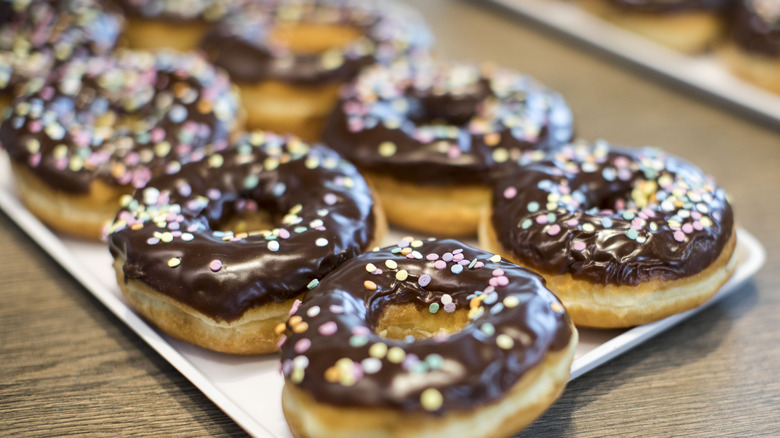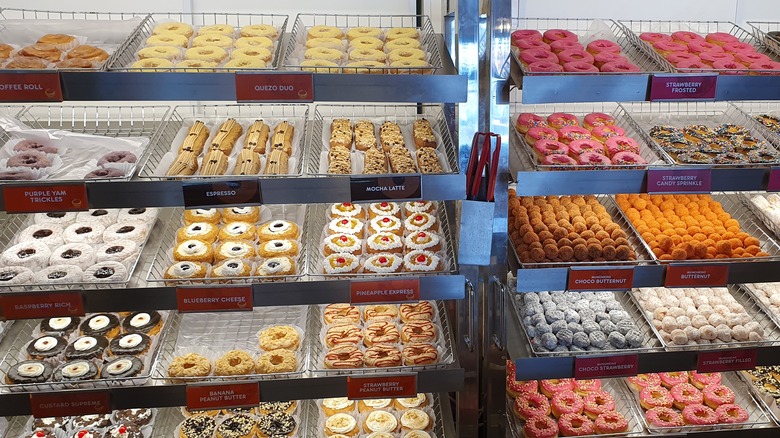We Finally Know Where Dunkin' Gets Its Donuts From
America may run on Dunkin', but have you ever wondered how Dunkin' runs? Maybe, while waiting for your coffee some mornings you've absentmindedly wondered if all those doughnuts (or donuts, if you prefer) on display were really baked in that tiny kitchen back there. (Or maybe you've never had this thought because you don't do much wondering until you've had your coffee. Fair enough.) Either way, thanks to a Dunkin' franchisee who has taken to TikTok, we have the insider scoop at last.
Amir Mohamed is a 29-year-old serial franchisee (in addition to Dunkin', he oversees Johnny Rockets and Cafe Landwer locations) based in Beverly Hills. In a TikTok video, he explains that Dunkin' franchisees have three options when it comes to Dunkin's doughnuts: They can make them in-house, they can order them from a regional central kitchen, or they can order premade, frozen doughnuts to simply heat up in the store.
Watch on TikTok
Because Dunkin' locations are franchised out, this choice falls on each individual location's management — which means that one location could be baking their pastries fresh each morning while the one across the street serves subpar frozen doughnuts. If you've ever noticed that one of your local shops is consistently better or worse than the others, doughnut sourcing might be part of the reason why.
It's time to make (or reheat) the doughnuts
Amir Mohamed shared that for several years, his Dunkin' location made doughnuts fresh in-house each morning. While he says that the fresh doughnuts tasted the best, having to make hundreds of them each day made for a chaotic kitchen. So he teamed up with several other franchisees in the area to construct a central kitchen, called a CML, where the baking for all of their shops takes place each night for early morning delivery.
The third option is what Mohamed calls JBOD, which refers to doughnuts that arrive at the store frozen and need to be reheated and glazed on-site. If that doesn't sound particularly appetizing, it's because they're not — Mohamed explicitly calls them "disgusting," and he urges other franchisees to avoid selling them.
If you feel like Dunkin's doughnuts just used to be better, you're probably not just wrapped up in nostalgia. The move over time to CMLs and especially to JBODs, in most cases probably comes with a shift in quality. Mohamed reminisces about how the fresh doughnuts made in-house were seemingly bigger and tasted markedly better, at least in his opinion; it's entirely possible that your local stores used to sell fresh doughnuts but now serve the frozen ones.
Doughnut detective
The comments on Mohamed's video are full of Dunkin' regulars asking if there's any way to know which locations are still making their doughnuts in-house. He responded in a follow-up video that the JBOD doughnuts are a little smaller and denser than the other preparations, but otherwise, there's no real tell-tale sign as to whether the doughnuts are fresh or frozen. That information isn't listed anywhere, so discerning doughnut connoisseurs will have to rely on their own powers of observation to try to suss out how their nearest Dunkin' gets its doughnuts. Or they could just ask a store employee.
The use of centralized kitchens isn't unique to Dunkin', and it's also not a guarantee that the food produced is going to be of poor quality. Mohamed emphasizes that the doughnuts from CMLs are baked fresh daily, just at an offsite facility. The practice is more common than you might think, and some of these baked goods are widely popular regardless (like, for instance, Olive Garden's famous breadsticks). But if you just can't find one that's up to snuff, you can always make your own doughnuts at home.


